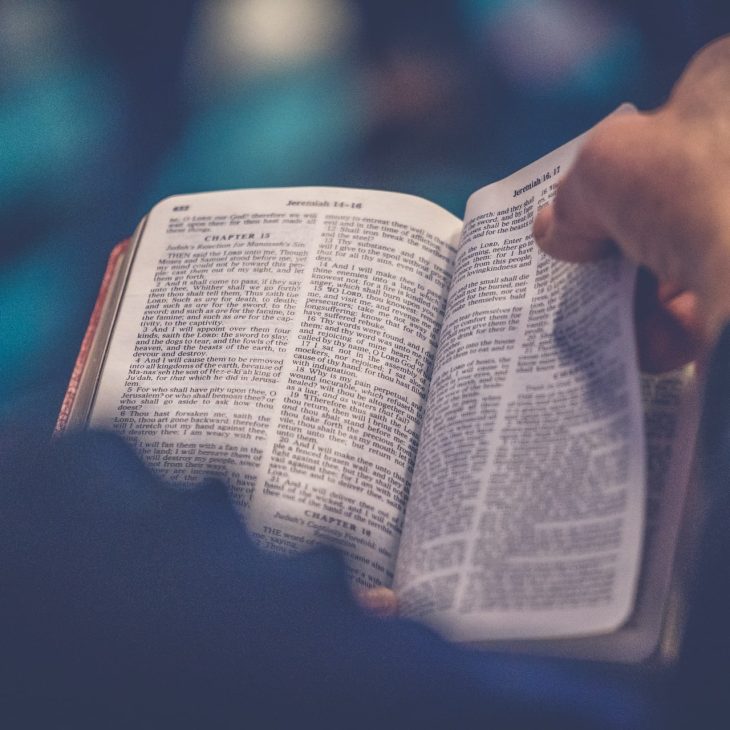The Other Reason Christians Must Reject Trump’s Photo-Ops
June 4, 2020

Christians from across the religious and political landscape have expressed discomfort to outrage over the past days as Donald Trump appropriated Christian sites and symbols to show strength during our nation’s great turmoil. On Monday, after the President gave an incendiary speech in the rose garden, he and his associates used tear gas and flash bombs to clear away peaceful protestors in service of a photo-op at St. John’s Episcopal Church, awkwardly posing with a Bible.
The next day, Trump made a visit to The Saint John Paul II National Shrine in Washington D.C., where he and his wife Melania Trump stood in front of a statue of the former Pope with a wreath composed of red and white roses with a card saying, “Mr. President” They also posed for another photo op inside of the empty shrine with photographers positioned directly on the altar to get their necessary shot.
Both the Catholic and the Episcopal Bishops objected to the use of their religious sites as backdrops for political posturing, with Washington Archbishop Wilton Gregory responded to the visit with dismay: “Saint Pope John Paul II was an ardent defender of the rights and dignity of human beings. His legacy bears vivid witness to that truth. He certainly would not condone the use of tear gas and other deterrents to silence, scatter or intimidate them for a photo opportunity in front of a place of worship and peace.” Episcopal Bishop Mariann Budde was equally adamant in her rejection of the President’s actions: “I am outraged. The President did not pray when he came to St. John’s, nor did he acknowledge the agony of our country right now.”
While Christians have voiced objections to the manipulation of their own religious symbols on behalf of politics, it is perhaps even more important for Christians like me to consider how the President’s religious posturing has a fearsome and chilling effect on our non-Christian friends and neighbors who are watching one dominant religion melded with military power to forge a ‘law and order’ rhetoric of the President.
There is, of course, a long tradition of a favored religion being put in service of a nation’s authoritarian leaders, providing a spiritual stamp of approval to militaristic rule. Putin and Erdogan both rallied a dominant religious tradition as the true faith of the country, sidelining others as secondary and tolerated. I fear what President Trump is doing is along those lines. In turning towards religious symbols of one tradition in this moment of turmoil, he is continuing to foster a hostile climate for Muslims, Sikhs, Jews, Hindus, and many others who are not Christians, and the many Americans who do not profess any religion at all.
I wrote to a friend from the Sikh tradition, Simran Jeet Singh, who is a professor of religion and a leader in interfaith work and asked him how he had experienced the President’s actions. His first response showed sympathy for Christians like me who, he knew, were dismayed by how our faith was being used. When I pressed him about how it affected him as a Sikh he wrote:
As a turban-wearing, beard-loving Sikh who grew up in Texas, I have always been aware that I was a minority in a Christian-majority nation. But there’s something substantively different—and disturbing—to realize that our nation’s leadership is wielding Christianity as a weapon. That’s not just wrong and un-Christian. It’s also concerning to know that when Trump sharpens the sword of Christian nationalism, there will be violent consequences for minority communities all over.
Dr. Varun Soni is the Dean of Religious and Spiritual Life at the University of Southern California, a lawyer, and a Hindu. He responded primarily as a lawyer:
One of the bedrocks of our secular democracy is the Establishment Clause of the First Amendment, which prohibits the endorsing or establishing of religion over another, and instead empowers the flourishing of all faiths in the public sphere. The symbolic implication of that photo – that the United States is fundamentally and constitutionally a Christian country – seems to undermine the aspiration of American secularism.
America is one of the most religiously diverse nations in the world, and, like our racial, cultural, and national differences, our religious diversity is one of our greatest strengths. Since the founding of our country, freedom of religion, and the equality of religious traditions before the constitution has been critical for our thriving. The hope is that our nation’s leaders will use their platforms to bring people from all faiths together to increase understanding and healing. Yet this is not what is happening, and in recent years, anti-Semitism, Islamophobia, and xenophobic violence are increasing. Rabbi Josh Stanton commented on how Trump’s Bible pose affected him and his community: “It makes me feel like Jews are not equal citizens in our country. There is separation between religion and state for a reason, so that we are all equal in practice as well as theory.”
In our current outrage over police brutality, white people are rightly being asked to step up, using our privilege in the fight for racial justice for Black Americans. So too, Christians must use our majority status and traditional privilege to decry the weaponized use of Jesus, the Bible, and the Cross. Now, more than ever, we need to stand shoulder to shoulder with people of all faith traditions and no religious tradition, standing in solidarity, building an interfaith America where all can live and thrive in peace.
Share
Related Articles
American Civic Life
American Civic Life
Is This a Time for Bridgebuilding? 5 Leaders in Conversation
American Civic Life
The Interfaith Legacy of Muhammad Ali: “The Wise Man Changes”



